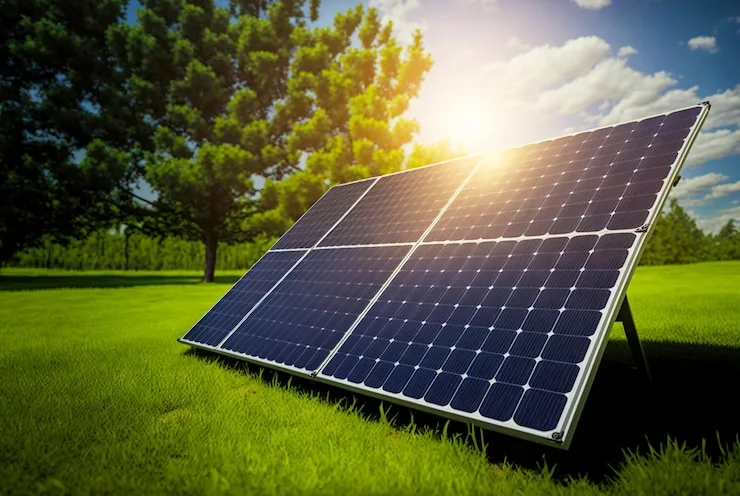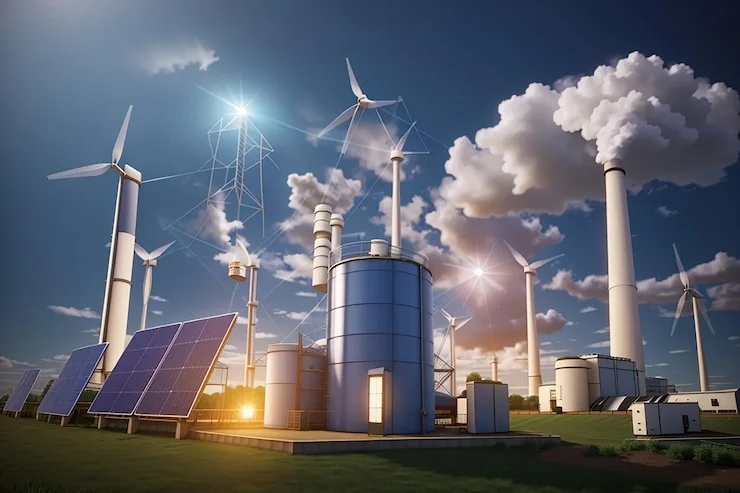Solar Energy Vs Fossil Fuels : Comparing Efficiency
Currently, many people use fossil fuels to save money and for convenience. However, experts do not consider fossil fuels renewable because their global supply is limited. In contrast, solar energy is a renewable energy source that harnesses natural power from the sun.
The sun gives light everywhere, but the amount of sunlight changes depending on where you are, the time, weather, and season. In California, a southwest-facing roof is ideal for solar panels. Solar can also be viable in other regions, especially if roofs receive minimal shade during the day.
Like any energy source, solar energy has pros and cons. The main drawbacks of solar panels are their expensive initial costs and lower energy efficiency. You may need more panels to generate the same amount of power. The physics of a solar panel determine its output, converting only specific light frequencies into electricity.
Despite seeming cheaper than solar energy, the health, economic, and environmental costs of fossil fuels far outweigh their value.
WHAT IS SOLAR ENERGY?

Solar energy is the energy that comes directly from the sun. Solar radiation, generated by the sun, regularly reaches our planet in the form of visible light. People consider the sun’s energy renewable because they cannot imagine the sun running out in the near future.
Solar panels are apparatuses that transform solar light into functional power. They absorb light and convert it into direct current (DC) energy. Several other benefits exist as well.
Solar energy continuously hits the Earth at an estimated 173,000 terawatts (trillions of watts). This amount is more than 11,000 times the planet’s energy consumption. Solar energy is completely renewable and will last as long as the sun continues to shine.
WHAT ARE FOSSIL FUELS?

Fossil fuels come from ancient animals and plants buried underground millions of years ago. They are not renewable. Geological processes transformed these ancient plants and animals into fuel over time.
People extract most fossil fuels by mining or drilling from underground deposits. Natural gas, oil, and coal are examples of fossil fuels. Mankind has relied on these fuels as vital energy resources since discovering them.
SOLAR ENERGY COSTS COMPARED TO FOSSIL FUELS
While the upfront costs of switching to solar energy are higher, it proves to be a cost-effective option in the long run. Electricity from fossil fuels typically costs between 5 and 17 cents per kilowatt-hour. Solar energy costs are decreasing, with prices ranging from 3 to 6 cents per kilowatt-hour. The National Renewable Energy Laboratory reported this information.
In 2020, the average cost of installing a solar energy system in the United States was between $15,000 and $18,000. This cost range includes state incentives. The cost of solar panels for homes has decreased by more than 55% in the past five years. This information comes from the Solar Energy Association.
Once installed, solar power systems require minimal maintenance costs. You can even earn money by selling excess energy generated by your solar panels back to your local grid. However, the initial investment for a full solar panel system is substantial.
While solar panels can significantly reduce your energy bills, not everyone can afford the upfront cost. Many solar energy companies offer financing and leasing options to help mitigate this initial expense.
Choosing a low-maintenance, economical, and energy-efficient system requires thorough research. Proper sizing of your solar energy system is crucial for optimal performance.
Consider selling extra solar energy to your utility company through net metering or storing it in batteries for later use. This can be more efficient than selling excess energy back to the utility at a lower rate.
Explore grants available from state, federal, and utility organizations to further reduce installation costs.
Solar power systems can produce energy from different sources. However, dirt, dust, shade, and the angle of the panels can reduce their efficiency. Some solar panels are self-cleaning or track the sun’s movement to optimize energy production.
Once you have installed a solar energy system, you can enjoy nearly free electricity from the sun.
WHICH ONE IS MORE BENEFICIAL FOR THE EARTH?
FOSSIL FUELS AND GREENHOUSE GASSES
Burning fossil fuels to create energy produces carbon dioxide (CO2). CO2 is a greenhouse gas. Greenhouse gasses trap in the atmosphere when released into the air.
Greenhouse gasses let sunlight in but also trap heat, keeping it from escaping into space. This trapped heat warms the Earth, leading to changes in climate patterns.
The U.S. Environmental Protection Agency (EPA) recognizes carbon dioxide (CO2) as the main greenhouse gas produced by human actions. In 2019, about 80% of U.S. greenhouse gas emissions were from human activities.
NASA says human activities have raised the level of carbon dioxide in the air by 48% in the past 40 years. Power Plants also naturally release some CO2. This human-induced increase is the most significant long-term factor contributing to climate change.
SOLAR REDUCES FOSSIL FUEL DEPENDENCE
With all the available information, it’s easy to overlook the existence of fossil fuels. Remember that fossil fuels can save money and create jobs globally.
The impact on our environment comes not from using fossil fuels, but from our dependence on them.
We can use different sources of energy to power our cars, homes, and daily activities, decreasing our reliance on fossil fuels. This will help reduce our carbon footprint.
Specifically, solar energy can aid in decreasing a home’s reliance on the power grid. Solar energy becomes less reliant on the grid when homes utilize it. While this may initially concern utility companies, it can actually help reduce pressure on the grid during peak times.
Battery storage in solar panels is becoming increasingly popular, allowing homeowners to store clean energy for future use. You can manage how much energy you use by using a battery to power your home. You can do this during outages or at night. The size of the battery will determine how much power it can provide.
Primary fossil fuels include petroleum (also referred to as crude oil), natural gas, and coal. Although the process of creating these fuels is natural, it takes a long time.
Fossils do not make fossil fuels. Long ago, plants and animals trapped energy in the Earth.
Over time, natural processes covered it and transformed it into fossil fuels. Buried organisms take a long time to turn into fossil fuels. This process can range from hundreds of thousands to millions of years.
Investigating or boring beneath the surface to locate fossil fuels is a feasible approach, but both techniques necessitate substantial operational costs. When we burn fossil fuels, we release the energy stored in the atoms for different purposes.
WHAT CAN SOLAR ENERGY DO?
Solar power doesn’t need fossil fuels, so it helps prevent greenhouse gas emissions into the air.
People commonly hear the phrase “reducing carbon dioxide emissions” in the news and discussions. A significant advantage of solar energy is the decrease in CO2 emissions.
A research conducted by the National Renewable Energy Laboratory (NREL) suggests that a 35% integration of solar and wind energy could lead to a 40% decrease in fuel expenses and a 25-45% reduction in carbon emissions. This reduction is roughly equivalent to removing 22-36 million cars from the road today.
As mentioned earlier, solar energy is a renewable resource. The sun gives us lots of energy. Engineers are always finding new ways to use this energy as technology gets better.
HOW WE CAN USE SOLAR ENERGY?
Within a single hour, the Earth receives sufficient solar power to fuel the whole globe for an entire year. Passive solar heating is a process where the sun heats your home through windows, using solar energy to heat your home.
Photovoltaic (PV) cells convert sunlight into electricity. Manufacturers make solar panels from these photovoltaic cells. They capture the sun’s energy and store it in solar batteries. An electrical control system often combines batteries to provide energy after sunset or to offset electricity usage.
Solar panels are capable of transforming approximately 20% of the absorbed sunlight into electrical energy. The panel produces DC power, which is then converted to AC power by an inverter.
Connecting to battery storage or utility systems can be complex. Ask solar installers and electrical engineers questions to avoid issues and ensure proper installation of the solar system. Make sure to ask the solar installers any questions you may have. Consult with electrical engineers to ensure correct installation processes.
There are some disadvantages to solar energy. The production and transportation of solar panels result in the emission of greenhouse gasses. However, compared to fossil fuels, the environmental impact of solar power is considerably less. How can we utilize solar power to benefit the environment?
BENEFITS AND DRAWBACKS OF FOSSIL FUELS
The most significant benefit of fossil fuels is our highly developed technology to convert them into electricity. People globally have used non-renewable resources for a long time. It took a significant amount of time to develop the methods we currently use.
Nonetheless, it’s hard to overlook their detrimental features. Owing to their substantial carbon emissions, fossil fuels play a significant role in climate change. The transport and manufacturing of fossil fuels can also result in hazardous mishaps.
The current global use of fossil fuels means that we feel somewhat obligated to continue using them. People are using up fossil fuels faster than they can replace them. Experts expect solar power to cost less than coal and other non-renewable sources in the next ten years.
PROS:
Cheap
Reliable
Well-developed technology
CONS:
Low energy independence for the population
Hazards during production
Non-renewable and unsustainable
Significant contribution to climate change
Why is Solar Better than Fossil Fuels?

Solar energy has the greatest environmental impact compared to fossil fuels. Solar panels are less efficient than coal and natural gas. Coal can reach up to 40% efficiency, while natural gas can reach up to 60%.
Once people burn coal, energy and fossil fuel, they use them up, but they can harness solar energy repeatedly. You may need to purchase additional solar panels to generate more energy.
This occurs because solar panels typically convert sunlight into electricity with an efficiency ranging from 15% to 20% of the energy they produce into electricity. Enhancing your solar panels with concentrated solar and backup batteries can increase their efficiency. Additionally, be mindful of using multiple appliances simultaneously to maximize solar energy use.
Although solar energy has higher upfront costs, it is much cheaper in the long run. Solar panels can last up to 35 years, helping you save money on your solar energy investment in the long run.
Solar energy is a renewable source that doesn’t release greenhouse gas emissions during operation. In contrast, burning fossil fuels emits carbon dioxide and other pollutants, contributing to air pollution, climate change, and environmental degradation. From an environmental perspective, solar energy is considered superior to fossil fuels.
Final Thoughts
The choice between solar energy and fossil fuels has significant implications for our planet and future generations. Solar energy provides a compelling solution to combat climate change and environmental degradation with its renewable nature, minimal environmental impact, and decreasing costs.
Fossil fuels, while efficient in energy conversion, have drawbacks such as greenhouse gas emissions, resource depletion, and economic volatility. Collaboration among governments, industries, and individuals is crucial as we navigate the complexities of transitioning to a sustainable energy system.
